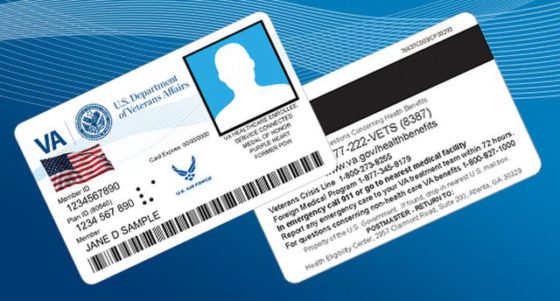by Courtney Mabeus, The War Horse
Jennifer Kreegar wanted to start 2019 worry-free. As January drew near, the Army veteran, who lives in a 19th-century farmhouse in east-central Indiana, opened one of her financial accounts to take care of one of the most mundane of tasks: pay her mortgage.
Kreegar worked in intelligence in Hawaii and at Fort Meade, Maryland. She left the Army in 1992 because she had completed her tour, but she was also experiencing neurological problems, including blinding migraines, for which she receives a partial disability payment. In late 2018, Kreegar lived paycheck to paycheck and depended on that monthly disability payment from the Department of Veterans Affairs to cover her bills.
But when she opened her Direct Express government debit card account, she watched as her balance drained, a little at first and then by about $1,000.
“It was there, and then, all of a sudden, right before my eyes, it just was all disappearing,” Kreegar said. “Somebody was in there.”
That “somebody” left Kreegar with $10 in the account and a fight to reach someone at Direct Express who could help prevent more damage.
Everything she had “was that check,” Kreegar said.
Kreegar had also unwittingly joined a larger group of veterans and other Americans who receive social security and disability benefits through a federal program that was targeted by fraudsters who stole their money. When the victims learned of the fraud and sought recourse, they hit multiple roadblocks, including an unreachable or unresponsive call center, several veterans told The War Horse. When they could get through, they encountered poor customer service and a lengthy, cumbersome—and possibly illegal—process to recover their money and protect their accounts.
For some, the experience has had a profound effect on their sense of security.
“I was a broken vessel,” said Derek Densmore, a medically retired Marine. “I was really hurt from this episode.”
“They’re like sitting ducks”
Direct Express is a prepaid debit card program administered by the U.S. Department of Treasury to deliver federal social security and disability benefits to those who don’t have bank accounts. Texas-based Comerica Bank has managed the program since it started in 2008 and subcontracts for call centers operated by Conduent. At least 4.5 million Americans rely on the program, including more than 131,000 veterans at one point, according to a VA document acquired by The War Horse.
It’s unclear how many veterans were affected by the scheme. After Sen. Elizabeth Warren began investigating in 2018, then-VA Secretary Robert Wilkie told her the agency didn’t know about the problem until her office contacted VA. After consulting with the Treasury Department, VA learned that out of a total 480 Direct Express account holders who had benefits stolen, 30 were veterans. The thieves made off with more than $460,000.

But not only does the government still use the program, the thieves also appear to be continuing to abuse it. The Consumer Financial Protection Bureau’s complaint database lists nearly 2,000 grievances against Comerica—the number four issuer of prepaid cards—since January 2017 among users who said they had a credit or prepaid card. Among those, more than 100 listed themselves as service members.
VA realized that starting its own prepaid benefits program would come with costs and risks. So, instead of taking action to distance itself from the Treasury Department, it launched a new program in 2019 to help beneficiaries manage their money more securely, including offering bank accounts to those who needed them. While Comerica has said that it was targeted by outsiders and that its own fraud rate is lower than the industry standard, some victims believe the thieves had inside help. Even so, the government awarded another contract to Comerica, which faces a federal lawsuit. When the victims grew angry, some turned to the internet. There they found a one-time Navy flight student and private investigator who turned his own problems with Direct Express into a crusade.
“You can’t get to the customer [service] people, you can’t get to the fraud unit,” said Jim “JB” Simms, who, after having his Social Security benefits siphoned off twice by fraudsters, decided to help other victims. “They categorize these instances as ‘mere inconveniences’—‘mere inconveniences’ for people who have lost their money, they can’t get their medication, can’t get their food. And they’re on hold for—I’m not exaggerating—an hour. An hour and a half.”
Warren’s office began investigating in 2018 after constituents, including Jackie Densmore, who lives in Massachusetts, complained to her office. Warren found that Comerica was responsible for dispersing nearly $90 million to about 84,000 veterans.
Densmore is the payee on her brother-in-law’s VA disability account. Derek Densmore served in the Marine Corps for 15 months from 2003 to 2004 before receiving a medical discharge. When Jackie Densmore called to check the account’s balance in early August 2018, a recording told her that a new card was being sent. That seemed “strange”—the old card hadn’t expired, she said.
But she wasn’t given the option to speak with anyone and tried to call a few more times during the week without success, she said. She finally got through more than a week later and used her information to verify the account. That’s when a representative told her someone had called Aug. 1 to report the original card lost. That person requested a MoneyGram under a cardless benefit that started in 2017 as a way to help those who lost their cards—and stole $814.
Densmore said there were few security measures required to access the account once she reached a customer service representative; her full name, address and date of birth, “not even a social security number.”
Comerica shut down the cardless benefit program in August 2018, American Banker reported. The bank blamed the fraud on organized crime rings that targeted the call center using information gleaned by other information breaches.
But Kreegar and Jackie Densmore said they believe the fraud on their accounts was an inside job.
“These criminals know when the deposits are going to happen,” Jackie Densmore said. “It’s like [the victims are] like sitting ducks. The person who called up knew exactly how much was in the account, knew enough to be the payee, pretend to be me.”
On New Year’s Eve 2018, the same day she watched thieves take money from her Direct Express account, Kreegar received a postcard in the mail telling her that her address and other information had been changed on Dec. 6. If she hadn’t authorized the change, the card read, she should call and report it. More than three weeks had passed.
“If I hadn’t done it, basically, I was supposed to notify them, but they make sure that you can’t get through to notify them,” Kreegar said.
While fraudsters reportedly also used postcards to deceive recipients, Kreegar said she was told by a Direct Express representative that they had sent her a card. Regardless of who sent it, she said, it was too little, too late. She found out “the hard way”—on her own—without any notification for weeks.
“That makes Direct Express even more dangerous,” she said.
Kreegar and Densmore turned to the internet when they couldn’t get through to Direct Express. That led them to Simms, an author and former private investigator. He’d been hit by thieves in January 2017, and then again that December.

Emails and documents that Simms shared with The War Horse show the effort he has put into fighting the VA, Treasury, and Comerica to fix failures, and he helped dozens of others after they reached out to him in frustration when their own efforts hit dead ends, he said. One of those victims was a retired Army master sergeant who discovered someone had taken $800 from her account after her card was declined at a dollar store in early January 2019. After numerous calls to try to reach someone, she was told she would have 10 days to fill out and return a fraud packet to be reimbursed. The packet arrived 10 days later. The former soldier, who had a son in a wheelchair, Simms said, became ill and died less than two weeks later.
Simms wrote an email to Comerica and others involved with Direct Express on Jan. 25, 2019, about an hour after he learned of her death. It wasn’t until he gave the woman direct numbers of people to call at Conduent that anyone admitted receiving her paperwork, he wrote.
“Conduent and Comerica Bank added to her stress,” he wrote. “If she had not called me, Conduent and Comerica Bank would have sat on the approximately $800 and deprived her wheelchair-bound son his care.”
The woman’s husband could not be reached by The War Horse.
Kreegar, Densmore, and Simms are part of a federal class action lawsuit filed in U.S. District Court in San Antonio in 2019. The lawsuit, which also includes civilian beneficiaries on social security, alleges that Comerica, and by extension, Conduent, failed to safeguard customer information and violated federal electronic banking regulations by improperly investigating and denying claims and failing to reimburse beneficiaries in a timely manner.
The VA in late 2019 announced the Veterans Benefits Banking Program, which allows beneficiaries to open bank accounts through a partnership with the Association of Military Banks of America. In early March, VA said in a news release that about 50,000 veterans had switched to receiving their benefits via direct deposit. Other options, including electronic funds transfer to a bank or credit union account; Direct Express; and paper checks, which are approved through a Treasury Department waiver, remain.
“Providing our Veterans and other beneficiaries different options to receive VA benefits electronically allows them to manage their monetary benefits more effectively and to reduce the instances of fraud they experience,” VA said in a statement to The War Horse.
VA did not respond to additional questions from The War Horse, including how it is reaching out to veterans to make them aware of the VBBP program or how many new complaints the agency is aware of, nor did it make a representative from that program available for interview.
And there are newer complaints. A search of the Consumer Financial Protection Bureau’s complaint database reveals Direct Express remains a source of frustration among those who identified themselves as service members. One person, who said they were a veteran with health problems from Florida in a complaint filed Jan. 30, 2020, said they’d been unable to resolve a fraud claim of more than $500 despite numerous attempts, including one in which they were told to email a photo of the disputed transactions. That was denied without explanation, the person wrote.
“They are liars and use stall tactics in the hopes that Vets like me will give up,” the person wrote. “Unethical. Immoral. Disgusting.”
Comerica spokesperson Louis Mora declined to comment on the lawsuit as well as to answer questions about additional controls put in place to protect beneficiaries. He also declined to address more recent complaints filed with the CFPB by veterans or provide updated figures on fraudulent activity.
A Conduent spokesperson referred questions to Comerica.
The Treasury Department awarded Comerica another five-year contract in 2020, despite complaints of fraud and mismanagement noted in treasury inspector general audits.
Simms, Densmore, and Kreegar question why Comerica was awarded the contract a third time, given its documented problems. A 2020 Treasury press release said “rigorous customer service requirements” and more reporting requirements were added to the new agreement, which align with recommendations from auditors.
The Treasury Department declined to answer questions about those new requirements, citing ongoing litigation.
Simms and Densmore said another company, i2c Inc., has been added to the program and handles newer accounts. The War Horse called the Direct Express customer service line and reached a call center operated by the company, but neither Treasury nor Comerica would confirm their role, and representatives from i2c did not respond to emails or a phone message.
“I’m disturbed this is happening to fellow veterans”
When Kreegar couldn’t get through to Direct Express, she called VA to stop her enrollment and has since received a check. But the experience left her angry and constantly on the offensive to guard her accounts.
Kreegar said she is speaking up because she worries about what might happen to other veterans, including those who may be more vulnerable. She eventually reached a Conduent employee who told her it appeared the money was taken from two ATMs in Georgia. Using Google Maps, she pinpointed the ATM locations and filed a police report, but nothing was done, she said. She blamed that breach on a host of other issues she’s subsequently had, including an attempt by someone to hijack one of her accounts for an Uber ride in Virginia.
Jackie Densmore was eventually able to get the transaction number that led to the theft from her brother-in-law’s account and traced it to a Walmart in Hollywood, Florida. Video of the encounter showed an older woman using an ID to make the withdrawal, but no one recorded her license plate number, Densmore said. Police have not been able to do anything in the case, she said.
Derek Densmore said the episode caused his anxiety to shoot “through the roof” and led to additional medical appointments as a result.
“I would say that I’m disturbed this is happening to fellow veterans of my caliber who served willingly with a sense of urgency,” he said.
This article first appeared on The War Horse, an award-winning nonprofit news organization educating the public on military service. Subscribe to their newsletter
 Soldier of Fortune Magazine The Journal of Professional Adventurers
Soldier of Fortune Magazine The Journal of Professional Adventurers






